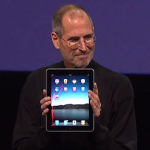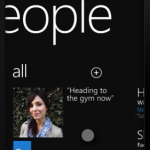Apple's problem with Flash is mobile applications competition

Apple CEO Steve Jobs wants publishers to support iPad, but not with Adobe Flash. Jobs' anti-Flash campaign has grown bolder since the company announced iPad last month and during this week's Mobile World Congress, where Flash 10.1 inched a little close to widespread mobile device availability. What's Apple's problem with Flash? Simply put: Competition.
Apple wants to control the entire mobile applications stack. The App Store/iPhone/iPod touch platform, which will soon include iPad, is a closed stack that Apple tightly controls. For developers, it's Apple's way or no way. But Apple could conceivably lose control of the stack -- most importantly the applications and their user experience -- should Flash run free and unfettered on iPhone OS devices.
Windows Phone 7 Series is a lost cause

Could Windows Phone 7 Series save Microsoft's mobile platform? Yes. In 2007. In 2010, it's a non-starter. That's not easy for me to write, because with Windows Phone 7 Series Microsoft is following much of the advice I offered via blog posts over the last few years.
That advice would have meant something when given, not months and years later when the competitive landscape has radically changed. Then there is the crucial analysis given last week -- that Microsoft failed to deliver on: Immediate release of new phone software and/or Microsoft phone. Holiday delivery on new Windows Phone 7 Series handsets is simply too late.
Windows Phone 7 Series: The good, the bad and the ugly

Earlier today, Microsoft CEO Steve Ballmer announced Windows Phone 7 Series at Mobile World Congress in Barcelona, Spain. The new operating system is a bold move for Microsoft, which is looking to reinvigorate its mobile strategy. But how bold is Windows Phone 7 Series in context of other mobile platforms? That's the question this post seeks to answer.
Because I'm miserably sick with the flu today, I'll limit this post to three areas: Windows Phone 7 Series as Microsoft's mobile Manhattan Project, mobile applications competition and garnering developer interest.
10 ways Microsoft can save Windows Mobile -- starting NEXT WEEK!

What will Microsoft CEO Steve Ballmer announce during Monday's Mobile World Congress press event in Barcelona, Spain? There's what he will announce and what he should. I'm skipping the speculation about what and going right to should. Microsoft's mobile strategy is a mess. Apple and Google have routed Microsoft in mobile operating systems. Android and iPhone OS make Windows Mobile look about as fresh as Windows 95. Meanwhile, Microsoft has chased Research in Motion's BlackBerry in the enterprise for years, never making any real gains.
It's long past time for the Big Ballmer to step up and offer something substantial -- not promises of future technology coming but goodies available immediately or nearly so. I've condensed what easily was a list of 15 or so items down to 10 things Microsoft must do immediately to save Windows Mobile from extinction. Microsoft has no more time. It's do or die, and even doing now may be too late. With that introduction, Microsoft should:
Why is Google suddenly so evil?

Google is the great Internet God of goodness, or so claims No. 6 of the company's "10 Things" corporate philosophy list: "You can make money without doing evil." But this week, Google has suddenly put its doing no evil claims in doubt.
Yesterday, Google launched social networking service Buzz with opt-out privacy settings, meaning that a user's list of followers and followees are fully viewable in Google Profile, by default. Unrelated, but by Twitter -- ah, buzz -- standards even more evil: Google deleted six popular music blogs hosted at its Blogger service.
Why former employees say Microsoft can't innovate

By many measures, Microsoft is simply too big. The bigness is in the gut, like a middle-aged man who drinks too much beer and eats too many classic potato chips. In computing years, Microsoft most certainly is a middle-aged company. So is Apple, which by comparison is leaner and healthier. What's up with Microsoft's gut?
Based on communications with current and former employees, Microsoft's midriff problem is one of middling middle management. The number of middle mangers swelled over the last decade, and they also are the employees making key management decisions, which includes who gets laid off or fired and where the remaining people work. What manager will fire himself or herself? (Before continuing, let me be clear that only former Microsoft employees will be quoted, and anonymously at that. Current employees would only communicate with me on background, for concern of risking their jobs).
Microsoft Confessions: 'There were a ton of bozos'

Do middling, middle managers run Microsoft? That's the consensus among the former Microsofties who shared their work stories with me over the last couple months. The new work week starts with another Microsoft Confessional -- the fourth in four days -- from 13-year company veteran Boris, which isn't his real name, of course. Boris was smart enough to see the end coming, and he made preparations in the days before his May 2009 layoff. He learned to read middle managers the way a genuine fortune teller might read tea leaves.
People being asked to leave are one view of Microsoft. But those leaving voluntarily are another perspective. In looking at Microsoft, I'm hugely concerned about the departures of two important and long-time Microsoft executives: Mike Nash and Bill Veghte, revealed on February 4 and January 14, respectively. Both men are 19-plus years veterans working for the Windows and Windows Live groups. Nash is headed to Amazon, and Veghte departs following last year's executive shuffle that put Steven Sinfosky in charge of the group (as one of five Microsoft presidents).
Microsoft Confessions: 'Poor worker bees'

Today's Microsoft Confession comes from a woman let go during the first round of layoffs, in January 2009. I'll call her Amanda, which, of course, isn't her real name. Amanda shared key elements of her story on deep background, but she also provided a reflective portion that she hopes will give deeper insight to anyone looking to work for Microsoft or to HR departments looking to hire former employees.
By telling this story, Amanda wants to give some meaning to her layoff, or so I detected from what she shared for private and public consumption. Amanda's story is consistent with every other I received. She sharply criticizes Microsoft's culture of reorganization, but also emphasizes the heavy workload. I detect deep frustration in her story about Microsoft management problems that won't easily be fixed.
Microsoft Confessions: 'Deeply dysfunctional family'

The next former Microsoft employee story comes from someone I'll call Fred, which, of course, is not his real name. Fred took a job right out of college and might still work at Microsoft today, if not for the elimination of his group during layoffs last year. Like the former Microsoftie from the first post in this former employee "confession" series, Fred helplessly watched as the exciting and flexible workplace he joined bogged down in increasing layers of middle management.
When Microsoft hired Fred nine years ago, the company employed a little more than 47,000 people. When he was laid off in May 2009, the number was around 93,000. That number is for full-time employees and doesn't include contractors. According to Microsoft's fiscal 2010 10-K, the breakdown on June 30, 2009: "56,000 in the United States and 37,000 internationally. Of the total, 36,000 were in product research and development, 26,000 in sales and marketing, 17,000 in product support and consulting services, 5,000 in manufacturing and distribution, and 9,000 in general and administration."
Microsoft Confessions: 'Killed over politics'

Yesterday's Dick Brass commentary, "Microsoft's Creative Destruction," the company's response to the op-ed and Tuesday's Don Dodge pro-Mac post have put Microsoft in the hot seat. The blogosphere is abuzz about the extent of Microsoft innovations. More former Microsofties are ready to speak out, and they will get their chance here at Betanews.
After the last round of Microsoft layoffs, I asked former employees to tell their stories. I got plenty of responses and not just from people recently leaving the company. No identities will be revealed, although I have verified each one. Two main reasons: Either the former employees still work in the technology industry and don't want to risk their current jobs; or they're receiving severance from Microsoft and don't want to risk losing it. Some of these people have returned to working for Microsoft as contractors, which is another reason to remain anonymous.
Don Dodge: The new anti-Microsoft evangelist

Somebody at Microsoft should be fired for laying off Don Dodge. The list of reasons why his layoff was stupid gets longer by the day. Yesterday's Dodge blog post, "From MSFT evangelist to Mac enthusiast -- the other side of the road," adds another reason. This Silicon Valley insider, who for five years evangelized Microsoft, has taken on the true tone of conversion -- a man filled with new Apple and Google religion. His conversion to the new faith is nothing short of tech evangelism disaster for Microsoft.
In my late-December post, "10 things Microsoft did wrong in 2009," "laid off Don Dodge" ranked No. 3. What seemed bad for Microsoft then is suddenly much worse.
Five cures for Microsoft's Internet Explorer 6 ills

Microsoft shouldn't let Google set the Internet Explorer 6-ending agenda. Google services will stop supporting the browser, starting on March 1. It's Microsoft 's browser and responsibility for putting this antiquated technology -- and all Internet users subsequently affected by malicious and criminal activity -- out of misery. Save the Web! Stop Internet Explorer 6 now!
If security really is Microsoft's top priority -- and I say that it's not -- IE6 shouldn't be used by anyone anywhere. Microsoft bears the blame for the IE6 scourge. High IE6 usage is more than a situation of users clinging to older technology. Microsoft created this problem by:
Sony shows how to lift Windows PCs out of the low-price doldrums

Windows PC vendors can effectively raise selling prices -- not that it will be easy, particularly as long as they sell netbooks. One Windows PC OEM shows the way. Today, Sony announced new E-series laptops packing Intel i3 and i5 core processors and boasting, brashy colored exteriors. The $799.99 price is about $326 more than the average selling price of laptops sold at US retail in fourth quarter, according to NPD data.
The $500-$1,000 price brand also is where Apple doubled its US retail unit share year over year in fourth quarter. Similarly, Apple unit share for retail PCs selling in the premium price brand -- more than $1,000 -- rose from 79 percent to 90 percent. Both segments are where the margins are.
Good riddance: Google's official Internet Explorer 6 killing memo

This evening, I received Google's official e-mail about ending support for Internet Explorer 6. Good riddance. Why isn't Microsoft doing something so ambitious as surgically removing the IE6 scourge from the Web? There are laws preventing rickety, unsafe vehicles from driving on the highways. Why is there no Microsoft prohibition against driving IE6 down the Information Superhighway? It's time Microsoft booted one of the vehicle's wheels so no one can drive it -- then haul the miserable wreck to the junk yard.
But Microsoft will talk security but do nothing because so many people still use that buggy old buggy. According to Net Applications, IE6 usage share was 20.07 percent in January -- nearly 6 percent ahead of IE7. Surely some Microsoft managers are thinking like this: With overall IE usage share eroding (about 62 percent in January), forcibly locking out IE6 users from Microsoft sites could send them somewhere else. Google is going to lock out IE6 users anyway.
Nine out of 10 premium-priced PCs sold at US retail is a Mac

Windows 7 did little to slow the Mac's sales trajectory during fourth quarter, according to NPD. Year over year, Apple doubled US retail unit share -- from 5 percent to 10 percent -- for PCs selling between $500 and $1,000. More startling, Apple increased its unit share from 79 percent to 90 percent in the market for "premium" PCs, meaning those selling for more than $1,000. In July, I reported that Apple's revenue share for PCs selling for more than $1,000 was 91 percent, because of higher average selling prices; nearly all Macs sold for more than $1,000. Now Apple benefits from 90-percent unit share, too.
Stated differently: Nine out of 10 premium PCs purchased from US retail brick-and-mortar stores or online sites (including major chains and Apple Store) during fourth quarter was a Mac. The data isn't good for Microsoft's Windows PC partners. Microsoft and OEMs touted more feature-rich Windows 7 PCs for the holidays. Additionally, ahead of Windows 7's launch, Microsoft spent six months marketing premium Windows PCs during its "Laptop Hunters" campaign. These marketing efforts apparently failed. Apple doesn't just own the premium market, its sales are increasing there.
Joe's Bio
Joe Wilcox is BetaNews executive editor. His motto: Change the rules. Joe is a former CNET News staff writer, JupiterResearch senior analyst, and Ziff Davis Enterprise Microsoft Watch editor.
Ethics Statement© 1998-2025 BetaNews, Inc. All Rights Reserved. About Us - Privacy Policy - Cookie Policy - Sitemap.
